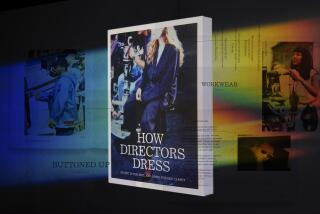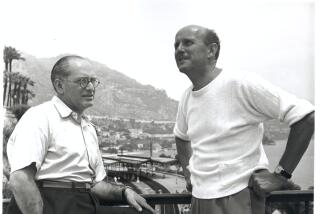Their life in film
The six directors who came together to talk to The Envelope about their craft all made fiction films, even if some of their stories were inspired by real people. While David Fincher’s “The Social Network” and Tom Hooper’s “The King’s Speech” are based on the respective lives of Facebook’s Mark Zuckerberg and Britain’s King George VI, the other four films are wholly imagined tales: Ethan (and Joel) Coen’s “True Grit,” Ben Affleck’s “The Town,” Lisa Cholodenko’s “The Kids Are All Right” and Darren Aronofsky’s “Black Swan.”
But even when the directors are inventing or adapting fictional narratives, it is inevitable that their personal lives somehow will influence their work. Here are excerpts of how the directors can — and cannot — separate art and life.
At what point do you work with the material that you have, and at what point do things that you know about shape the story you’re trying to tell?
Lisa Cholodenko: The germ of the whole thing was based on my own experience — my partner and I wanting to have a kid, start a family and imagining how to do it, and then choosing to go to an anonymous sperm donor. But after that point, everything was just kind of pulling from some experience, other people’s experience and fantasy experience. You just start somewhere that’s rooted in your own and then you go off.
Ben?
Ben Affleck: I wasn’t a bank robber. [Laughter] But this is something where I did a lot of research. [“The Town” is based] on a book about these guys who robbed banks. And I thought, “I don’t know anything about this. I don’t know any bank robbers. It just seems all distant and not real.” So I spent six months trying to meet people like that and kind of building that base of knowledge and information so that I could feel like I did understand it. I wanted to have a movie that dealt with themes that were interesting and relevant and resonant to me, and sort of encapsulate that in a more traditional genre, sort of heist movie. By raising those sorts of issues about children paying for the sins of their parents and that kind of stuff, I guess it’s all floating around somewhere in me, but it’s hard to put my finger on exactly how.
Are those choices conscious?
Tom Hooper: The strange thing about filmmaking is sometimes the personal connections come later. In the case of “The King’s Speech,” I’m half-Australian, half-English, so for years I’ve been looking for a story that explored that cultural interchange between those two identities. And when I read it, I immediately thought this is a fantastic opportunity to explore my heritage. But it was only when I was shooting it I kept thinking, “I feel incredibly at home making this film. Why am I so at home?” And then I realized that in many ways the film was playing out a key narrative of my childhood. Because my English father lost his father, and as a result he was packed off to full-time boarding school at age 5. And it was that year of cold baths in the middle of winter and corporal punishment — all those great British educational innovations. And my Australian mother basically said, “It’s our job within the family to unpack those effects.”
Darren, was “Black Swan” attractive because of what it said about an artist’s obsession?
Darren Aronofsky: Ballet is a very specific perfection. Perfection in filmmaking is … I think when I first got into it, I used to look at certain films and go, “That’s a perfect movie.” And I had aspirations to try and do something like that. But it was all kind of thrown out when I worked with Mickey Rourke [on “The Wrestler”]. That whole experience was — it’s all about the moment. And it’s all about just getting as many creative people focused in one place at one time to allow spontaneity to happen. And that’s sort of become the atmosphere I like to create on the set with my actors and my crew, just have everyone there and then just let craziness happen. There was a connection to dance about that, because dance is a strange art where it’s for the moment — it’s purely now, and then it’s gone.
Ethan, do you and Joel bring something personal to “True Grit’s” script?
Ethan Coen: This is based on a book and how the characters express themselves. And so really 90% of the dialogue was from the book. And how they express themselves is so particular and so much a part of their characterization and so much a product of the period that it’s not the kind of thing you can improvise around. This was more like doing a verse play or something. The actors really did the script.
David, is there a particular, personal way you like to work?
David Fincher: You create this bonfire. You got all the sticks. You gather all the stuff. And then you’re trying to make fire. And that’s the part of it that’s, those are the moments, watching, when somebody goes “Oh, I get what this is.” And they come up with something that you never thought of. And we’re all smart, and you kind of think you’re going into it knowing what it is. And then somebody says the dumbest thing that you just go, “Of course. I have to follow that now.” And you have to create an environment that allows for you to then to be drawn and seduced by the thing that was never self-evident until that moment.
More to Read
The biggest entertainment stories
Get our big stories about Hollywood, film, television, music, arts, culture and more right in your inbox as soon as they publish.
You may occasionally receive promotional content from the Los Angeles Times.











